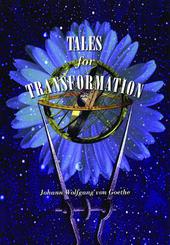
|
Tales for Transformation
Paperback / softback
Main Details
| Title |
Tales for Transformation
|
| Authors and Contributors |
By (author) Johann Wolfgang von Goethe
|
|
Translated by Scott Thompson
|
| Physical Properties |
| Format:Paperback / softback | | Pages:133 | | Dimensions(mm): Height 228,Width 177 |
|
| Category/Genre | Literary studies - general
Short stories |
|---|
| ISBN/Barcode |
9780872863637
|
| Classifications | Dewey:FIC |
|---|
| Audience | |
|---|
|
Publishing Details |
| Publisher |
City Lights Books
|
| Imprint |
City Lights Books
|
| Publication Date |
15 February 2001 |
| Publication Country |
United States
|
Description
In 1768, at the age of nineteen, Johann Wolfgang von Goethe began to study hermetic literature. This exploration had a huge impact on the early aesthetic education of Europe's great man of letters, the last renaissance titan. In the years that followed, Goethe immersed himself in the hermetic tradition, and even set up an alchemic laboratory and attempted to make an elixir of immortality. Although he eventually gave up his alchemical experiments, he was to believe in the validity of the Great Work for the rest of his life. Alchemic symbolism is prominent in many of Goethe's works, and it is particularly abundant in the tales of self-mastery and transformation presented in this collection. Included here are new translations of "Fairy Tale" ("Marchen"), Goethe's alchemical allegory; "The Counselor" and "The New Melusina," stories of temptation and the tests of love; "The Good Woman," a curious discourse on aesthetics and the rights of women; and the lyrical prose masterpiece "Novelle." Here also for the first time in English is "The Magical Flute," Goethe's sequel to Mozart's opera, with themes of initiation, the magical power of music, and liberated genius.
Author Biography
Johann Wolfgang von Goethe (1749-1832) was a German writer, poet and playwright, among other things. He was well known for his epic novels and lyrical poetry. He was a participant in the Strum & Drang literary movement. His work "Gotz von Berlichingen" made him famous and his other work "The Sorrows of a Young Werther" marked the early phase of Romanticism.
|